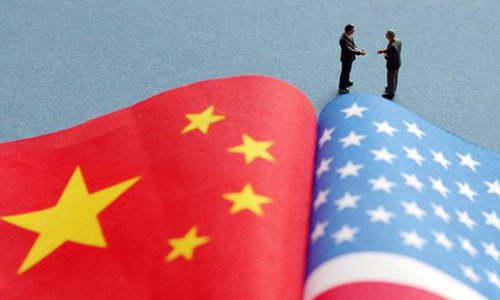HOME >> BUSINESS
No need to focus on whether Phase One trade deal can be inked within 2019
Source:Global Times Published: 2019/11/22 12:32:54

Chinese and US trade officials make attempt at striking a trade deal to defuse an increasingly bruising trade war that has rattled global markets and presented mounting challenges to both economies. Photo: VCG
There is no need to focus on whether or not a Phase One China-US trade deal can be signed before the year's end, Zhu Min, a former deputy managing director of the IMF, said on Friday.
"There have been detailed discussions about trade numbers during the China-US trade talks, but the US has always taken more things into consideration, complicating the negotiations," he told reporters on the sidelines of the New Economy Forum co-hosted by Bloomberg and the China Center for International Economic Exchanges in Beijing.
"The trade talks are contingent upon the US eventually becoming aware of the problem and thus striving to sit down with China to address some final issues," said Zhu, who is also a former deputy governor of the People's Bank of China, the country's central bank.
Resolving the China-US trade frictions will give a big boost to the global economy in the next two years, as the tensions between the world's two largest economies have been widely acknowledged as one of the main factors weighing on global growth, he said.
Imports between the two countries have fallen about 10 percent on either side, 18 months after the trade dispute first erupted. But China still managed to record a 3 percent growth in trade, as the nation has moved to diversify its trade to overcome the difficulties, Zhu noted.
Chinese electronic goods and manufacturing items accounted for more than 20 percent of the US market prior to the trade frictions and have now shrunk to about 12 percent, with countries including Mexico, Canada and several in Europe filling the supply gap, according to Zhu.
China's trade has gradually steadied as the nation moves to explore third markets. "A substantial decline in trade and a drastic fall in economic growth which some international observers were worried about didn't occur, pointing to the potential and resilience of the Chinese economy," he went on to say.
The US, for its part, has seen its current account deficit as a percentage of GDP shoot up from 2.9 percent to 3.2 percent. This suggests the trade war is failing to address the issue of the US' current account deficit, stressed Zhu, who is currently the Chairman of the National Institute of Financial Research at Tsinghua University. He added that, more worryingly, tariffs mean additional costs are put on US companies and consumers.
Global Times
RELATED ARTICLES:
Posted in: ECONOMY